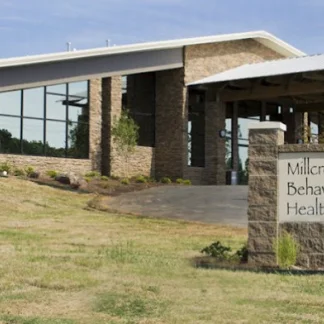The Pointe Outpatient Behavioral Health Services - Fordyce
The Pointe Behavioral Health Outpatient Services - Fordyce is a private behavior...
Millcreek Behavioral Health is a private mental health treatment facility in Fordyce, Arkansas, just north of Jug Creek. They specialize in treating emotional and developmental disorders. They serve children and teens.
Millcreek Behavioral Health offers two distinct residential programs: the Psychiatric Residential Treatment Program (PRTF) and the Residential Program for the Intellectually Challenged (ICF/IDD). PRTF hosts 111 clients and lasts four to six months, while ICF/IDD hosts 61 clients and lasts for 18 to 24 months.
The residential programs are designed for clients who have severe symptoms or who are otherwise considered high risk. Participants reside at the facility for the duration of treatment, where staff can monitor them and tend to their needs around the clock. Clients participate in group therapy, education groups, recreational activities, and life-skills development. Clients also receive medication management services.
Before completing the program, clients participate in discharge planning with their care team. This stage establishes a plan for clients to follow once they leave the program. Discharge planning typically puts clients in touch with local resources to help them continue supporting their recovery.
Millcreek Behavioral Health accepts SSI Medicaid, Medicaid A, TRICARE, and some state Medicaid and private insurance plans. However, clients should contact their insurance provider to confirm coverage, as in network and out of network benefits can vary.
Contact us for more information: (501) 222-1623

Connect with Millcreek Behavioral Health by calling their admissions team directly.
(501) 222-1623 Website Get DirectionsThe Joint Commission, formerly known as JCAHO, is a nonprofit organization that accredits rehab organizations and programs. Founded in 1951, the Joint Commision's mission is to improve the quality of patient care and demonstrating the quality of patient care.
Joint Commission Accreditation: Yes Accreditation Number: 1581
Cognitive Behavioral Therapy (CBT) is a therapy modality that focuses on the relationship between one's thoughts, feelings, and behaviors. It is used to establish and allow for healthy responses to thoughts and feelings (instead of unhealthy responses, like using drugs or alcohol). CBT has been proven effective for recovering addicts of all kinds, and is used to strengthen a patient's own self-awareness and ability to self-regulate. CBT allows individuals to monitor their own emotional state, become more adept at communicating with others, and manage stress without needing to engage in substance abuse.
Research clearly demonstrates that recovery is far more successful and sustainable when loved ones like family members participate in rehab and substance abuse treatment. Genetic factors may be at play when it comes to drug and alcohol addiction, as well as mental health issues. Family dynamics often play a critical role in addiction triggers, and if properly educated, family members can be a strong source of support when it comes to rehabilitation.
Group therapy is any therapeutic work that happens in a group (not one-on-one). There are a number of different group therapy modalities, including support groups, experiential therapy, psycho-education, and more. Group therapy involves treatment as well as processing interaction between group members.
In individual therapy, a patient meets one-on-one with a trained psychologist or counselor. Therapy is a pivotal part of effective substance abuse treatment, as it often covers root causes of addiction, including challenges faced by the patient in their social, family, and work/school life.
Research clearly demonstrates that recovery is far more successful and sustainable when loved ones like family members participate in rehab and substance abuse treatment. Genetic factors may be at play when it comes to drug and alcohol addiction, as well as mental health issues. Family dynamics often play a critical role in addiction triggers, and if properly educated, family members can be a strong source of support when it comes to rehabilitation.
Group therapy is any therapeutic work that happens in a group (not one-on-one). There are a number of different group therapy modalities, including support groups, experiential therapy, psycho-education, and more. Group therapy involves treatment as well as processing interaction between group members.
In individual therapy, a patient meets one-on-one with a trained psychologist or counselor. Therapy is a pivotal part of effective substance abuse treatment, as it often covers root causes of addiction, including challenges faced by the patient in their social, family, and work/school life.
Group therapy is any therapeutic work that happens in a group (not one-on-one). There are a number of different group therapy modalities, including support groups, experiential therapy, psycho-education, and more. Group therapy involves treatment as well as processing interaction between group members.
In individual therapy, a patient meets one-on-one with a trained psychologist or counselor. Therapy is a pivotal part of effective substance abuse treatment, as it often covers root causes of addiction, including challenges faced by the patient in their social, family, and work/school life.
In individual therapy, a patient meets one-on-one with a trained psychologist or counselor. Therapy is a pivotal part of effective substance abuse treatment, as it often covers root causes of addiction, including challenges faced by the patient in their social, family, and work/school life.
The Pointe Behavioral Health Outpatient Services - Fordyce is a private behavior...